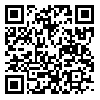Volume 14, Issue 2 (Vol.14, No.2, 2018)
irje 2018, 14(2): 166-176 |
Back to browse issues page
Download citation:
BibTeX | RIS | EndNote | Medlars | ProCite | Reference Manager | RefWorks
Send citation to:



BibTeX | RIS | EndNote | Medlars | ProCite | Reference Manager | RefWorks
Send citation to:
Heidari S, Kavousi A, Rezaei Tabar V. Causal Relationship between Variables Related to Breast Cancer using Bayesian Networks. irje 2018; 14 (2) :166-176
URL: http://irje.tums.ac.ir/article-1-6039-en.html
URL: http://irje.tums.ac.ir/article-1-6039-en.html
1- Msc Student, Department of Biostatistics, SBMU School of Para-Medical Sciences, Shahid Beheshti Medical University, Tehran, Iran
2- Associate Professor, School of Health, Safety and Environment, Shahid Beheshti Medical University, Tehran, Iran
3- Assistant Professor, Department of Statistics, Faculty of Mathematics and Computer Sciences, Allameh Tabataba'I University, Tehran, Iran
2- Associate Professor, School of Health, Safety and Environment, Shahid Beheshti Medical University, Tehran, Iran
3- Assistant Professor, Department of Statistics, Faculty of Mathematics and Computer Sciences, Allameh Tabataba'I University, Tehran, Iran
Abstract: (6485 Views)
Background and Objectives: Breast cancer is the most common cancer in Iran. It can be prevented by rapid diagnosis of the disease. Thus, it is necessary to determine the causal relationships between variables related to breast cancer. Bayesian network is a data mining tool that shows the causal relationship between different variables. In this paper, a Bayesian network was applied to find causal relationships between breast cancer variables using a genetic algorithm in a graphical model.
Methods: in this applied study, data were collected from 900 breast cancer patients in Kerman Province from 1999 to 2008. For data analysis, we used a probabilistic graphical model representing the causal relationship between variables.
Results: The results showed that surgery was the most important treatment for breast cancer. Based on the conditional and marginal probabilities, the women who underwent surgery had higher hopes of living longer. Moreover, 81% of the patients who did not undergo surgery only received chemotherapy or radiotherapy were less likely to have long lives.
Conclusion: People aged 40-65 years are more likely to have breast cancer. Moreover, the variables of age, surgery, chemotherapy, and radiotherapy had a direct effect on the status of the patients and there were direct edges from these variables to the status of the patients.
Methods: in this applied study, data were collected from 900 breast cancer patients in Kerman Province from 1999 to 2008. For data analysis, we used a probabilistic graphical model representing the causal relationship between variables.
Results: The results showed that surgery was the most important treatment for breast cancer. Based on the conditional and marginal probabilities, the women who underwent surgery had higher hopes of living longer. Moreover, 81% of the patients who did not undergo surgery only received chemotherapy or radiotherapy were less likely to have long lives.
Conclusion: People aged 40-65 years are more likely to have breast cancer. Moreover, the variables of age, surgery, chemotherapy, and radiotherapy had a direct effect on the status of the patients and there were direct edges from these variables to the status of the patients.
Type of Study: Research |
Subject:
General
Received: 2018/09/26 | Accepted: 2018/09/26 | Published: 2018/09/26
Received: 2018/09/26 | Accepted: 2018/09/26 | Published: 2018/09/26
| Rights and permissions | |
 |
This work is licensed under a Creative Commons Attribution-NonCommercial 4.0 International License. |





